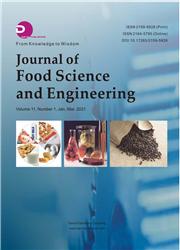Application of Antimicrobial Bacillus subtilis Strain as a Starter Culture to Improve Qualities and Safety of Fermented Soybean (SIENG) Produced in Cambodia
引用次数: 1
Abstract
: Fermented foods play a very important role in Cambodian health and nutrition, as well as other developing countries where food preservation methods may be limited. SIENG , a Khmer fermented soybean product, naturally contains both beneficial and pathogenic microorganisms. Traditional fermentation that relies on natural microbial flora and environmental conditions results in variable product quality and can lead to spoilage. A starter culture such as Bacillus subtilis can ensure the safety and stability of the products. The objective of this study is to control the growth of Gram positive pathogens contaminated into traditional fermented soybean ( SEING ) by using antimicrobial Bacillus subtilis isolated from the same kind of food. Out of 120 SIENG samples, 49 B. cereus strains were isolated, and 12 of B. cereus were positively synthesized compared with the lyophilized control enterotoxin. Two of these strains ( BTM8-7 and BTM8-8 ) produced high levels of enterotoxin. We identified five Bacillus strains with the ability to fight against indicator pathogenic microorganisms. Among the five strains, B. CeM6-2 had the highest activity level against Lactobacillus plantrum ATCC 8014 and the largest diameter. B. CeM6-2 tolerated up to 20 h at 30 °C and 22 h at 37 °C. In testing the strains with PK and PK-PMSF enzymes, bacteriocin produced by the strain B. CeM6PK untreated and B. CeM6-2PK-PMSF had a significantly stronger ability to suppress all the pathogenic indicators from 0 h to 47 h compared to the B. CeM6-2PK . Moreover, CeM6-2 outperformed the Miyagino strains, as it actively produced bacteriocin that fought against all four indicator strains of Gram positive and lactic acid groups, especially against Listeria monocytogenes , Streptococcus pyrogene , Leuconostoc mesenterids and L. plantarum , from 0 h-58 h and 0 h-40 h at 35 °C. CeM6-2 (1%) strain had the highest ability to fight against B. cereus at 24 h and at 34 h to 44 h incubation as well. CeM6-2 (10:0 mL) and CeM6-2 (9:1 mL) have the strongest ability to fight against B. cereus at room temperature (48 h and 72 h). The longer incubation and time at room temperature produce the highest level of bacteriocin. Thus, bacteriocins produced by B. CeM6-2 can be used as a preservative in food processing industries to avoid food spoilage even in higher temperatures and time.应用枯草芽孢杆菌作为起始培养基提高柬埔寨发酵大豆(SIENG)的质量和安全性
:发酵食品在柬埔寨的健康和营养方面发挥着非常重要的作用,在其他发展中国家,食品保存方法可能受到限制。SIENG是高棉发酵大豆制品,天然含有有益微生物和致病微生物。传统的发酵依赖于天然微生物菌群和环境条件,导致产品质量变化,并可能导致腐败。发酵剂培养物如枯草芽孢杆菌可以确保产品的安全性和稳定性。本研究的目的是利用从同类食品中分离的抗菌枯草芽孢杆菌来控制被污染到传统发酵大豆(SEING)中的革兰氏阳性病原体的生长。在120个SIENG样品中,分离到49株蜡样芽孢杆菌,与冻干对照肠毒素相比,12株蜡样双歧杆菌合成呈阳性。其中两个菌株(BTM8-7和BTM8-8)产生高水平的肠毒素。我们鉴定了五种具有对抗指示病原微生物能力的芽孢杆菌菌株。在5个菌株中,B.CeM6-2对植物乳杆菌ATCC 8014的活性最高,直径最大。B.CeM6-2在30°C下耐受20小时,在37°C下可耐受22小时。在用PK和PK-PMSF酶测试菌株时,与B.CeM6-2PK相比,未经处理的菌株B.CeM6PK-和B.CeM6-2 PK-PMSF-产生的细菌素在0小时至47小时内具有显著更强的抑制所有致病指标的能力。此外,CeM6-2的表现优于Miyagino菌株,因为它在35°C下从0 h-58 h和0 h-40 h主动产生细菌素,对抗革兰氏阳性和乳酸组的所有四种指示菌株,尤其是对抗单核细胞增多性李斯特菌、热原链球菌、肠系膜明串珠菌和植物乳杆菌。CeM6-2(1%)菌株在培养24小时和培养34至44小时时对蜡样芽孢杆菌的抗性最高。CeM6-2(10∶0mL)和CeM6-2在室温(48小时和72小时)下对蜡样芽孢杆菌的抗性最强。在室温下培养时间越长,产生的细菌素水平越高。因此,B.CeM6-2生产的细菌素可以用作食品加工行业的防腐剂,即使在更高的温度和时间下也可以避免食品变质。
本文章由计算机程序翻译,如有差异,请以英文原文为准。
求助全文
约1分钟内获得全文
求助全文

 求助内容:
求助内容: 应助结果提醒方式:
应助结果提醒方式:


